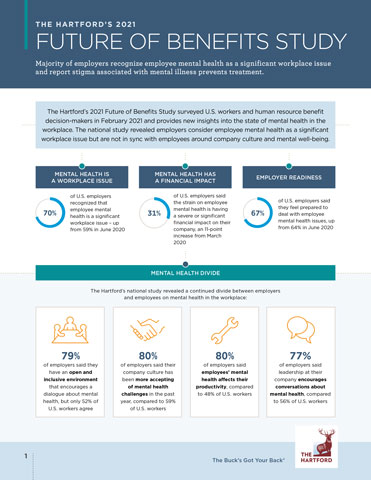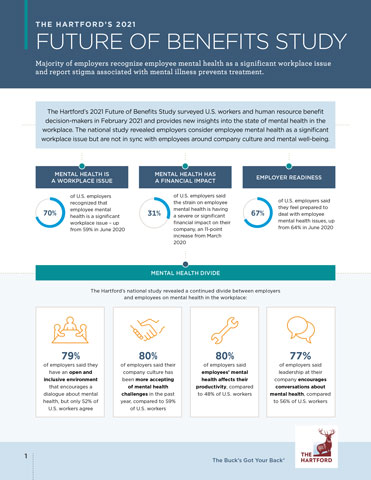HARTFORD, Conn.--(BUSINESS WIRE)--New research from The Hartford, a leading provider of workers’ compensation and disability insurance, found 70% of employers now recognize employee mental health is a significant workplace issue, and 72% said stigma associated with mental illness prevents U.S. workers from seeking help.
Also, 52% of employers said they are experiencing significant or severe workplace issues due to substance misuse or addiction among their employees, according to The Hartford’s 2021 Future of Benefits Study, which polled U.S. workers and human resource benefit decision-makers this spring.
“A majority of employers said they feel prepared to support their employees’ mental health, and we applaud their efforts to support employees’ overall well-being during these times of intense change,” said The Hartford’s Chairman and CEO Christopher Swift. “Our new data on stigma is a wake-up call. As the U.S. economy is re-built, we urge business leaders to continue to prioritize employee mental health – fostering stigma-free company cultures, increasing access to resources, and encouraging early treatment.”
Today, Swift will speak at The Hill’s virtual event, “Mental Health, Addiction, and the COVID-19 Pandemic.” Other scheduled speakers include Dr. Rachel Levine, assistant secretary of health for the U.S. Department of Health and Human Services (HHS); U.S. Rep. Jahana Hayes (D-CT), Member of the Youth Suicide and Mental Health Task Force and Congressional Black Caucus; U.S. Rep. David Joyce (R-OH), co-chair of the Addiction, Treatment, and Recovery Caucus; U.S. Rep. John Katko (R-NY), co-chair of the Mental Health Caucus; Daniel H. Gillison Jr., CEO of the National Alliance on Mental Illness (NAMI); Courtney Hunter, vice president for state policy for Shatterproof; Dr. David Fiellin, director of the Yale Program in Addiction Medicine; and Jim Carroll, co-founder of DC Consulting LLC and former director of the U.S. Office of National Drug Control Policy.
Mental Health Divide
While the national study showed employers have strived to support workforce well-being and foster a more compassionate workplace, employers and workers are divided in key areas about mental health in the workplace:
- 80% of employers said their company culture has been more accepting of mental health challenges in the past year, but only 59% of workers agree;
- 79% of employers said they have an open and inclusive environment that encourages a dialogue about mental health, compared to 52% of workers who agree;
- 77% of employers said leadership at their company encourages conversations about mental health, compared to 56% of workers who agree; and
- 78% of employers said workers have flexibility in their schedule to get the mental health help they need, but just 58% of employees agree about this flexibility.
These divergent perceptions indicate the pervasiveness and power of stigma, as well as the continued need for education and communication about mental illness and addiction.
Stigma’s Economic Cost
The research also showed the economic impact of untreated conditions due to stigma. One-third of U.S. employers (31%) said the strain on employee mental health is having a severe or significant financial impact on their company, a 10-point increase from the March 2020 survey. The Hartford’s claims data demonstrates that untreated mental health and substance use disorders can prevent lead to unplanned absences and prolonged disability. Mental health conditions are among the top five reasons for U.S. workers to file a short-term disability claim, according to The Hartford’s disability claims data (excluding pregnancy).1 A person diagnosed with a primary injury or illness, along with the presence of mental health conditions, such as anxiety or depression, takes two to three times longer to recover than someone with similar injuries or illness without those conditions.2
“The recent research from The Hartford is encouraging and shows U.S. employers are concerned for their employees’ mental health,” said NAMI’s CEO Gillison. “We are acutely aware that the need for mental health services is only increasing and reducing stigma in the workplace is paramount to improving the lives of employees. Mental health support in the workplace is a win-win for both workers and businesses.”
How To Be Stigma-Free
To help foster an open and inclusive work culture, The Hartford and NAMI recommend employers and workers:
- Learn more about mental health conditions and substance use disorder. Nearly half of adults with a substance use disorder also have a mental illness;
- Use respectful and first-person language to talk about mental illness and addiction, avoiding harmful words that perpetuate stigma; and
- Offer support if you think someone is having trouble. The NAMI Helpline at 800-950-NAMI provides information regarding available resources. If someone is in a crisis, text "NAMI" to 741741 crisis support via text message available 24 hours a day, seven days a week.
Employers can also:
- Provide mental health training to managers and senior leaders that includes information about mental illnesses, potential warning signs, and stigmatizing language guidelines;
- Offer an Employee Assistance Program, as well as sleep management, mindfulness, or other programs that help improve mental and physical health; and
- Communicate often, year-round about benefits and programs that support overall well-being. With additional communication, employees can more easily access the benefits and resources when the need arises.
“We are encouraged our survey showed a majority of employers and employees think mental health will become less stigmatized in the workplace as a result of the pandemic,” Swift said. “Mental health matters now more than ever. Together with NAMI, we remain committed to eradicating stigma that threatens human achievement so that more people can prevail.”
Methodology
The Hartford’s 2021 Future of Benefits Study was fielded from Jan. 11 – Feb. 19, 2021 and included 617 employers and 1005 employees. The previous two waves of the research were fielded in 2020. The first wave was fielded from Feb. 27 – March 13, 2020, just before the pandemic escalated in the United States, and included 761 employers and 1,503 employees. The second wave was fielded from June 15 – June 30, 2020 and included 567 employers and 1,038 employees. The employers surveyed were HR professionals who manage/decide employee benefits and employees surveyed were actively employed. The margin of error is employer +/- 4% and employee +/-3% at a 95% confidence level.
About NAMI
The National Alliance on Mental Illness (NAMI) is the nation’s largest grassroots mental health organization dedicated to improving the lives of individuals and families affected by mental illness.
About The Hartford
The Hartford is a leader in property and casualty insurance, group benefits and mutual funds. With more than 200 years of expertise, The Hartford is widely recognized for its service excellence, sustainability practices, trust and integrity. More information on the company and its financial performance is available at https://www.thehartford.com. Follow us on Twitter at @TheHartford_PR.
The Hartford Financial Services Group, Inc., (NYSE: HIG) operates through its subsidiaries under the brand name, The Hartford, and is headquartered in Hartford, Connecticut. For additional details, please read The Hartford’s legal notice.
HIG-E
Some of the statements in this release may be considered forward-looking statements as defined in the Private Securities Litigation Reform Act of 1995. We caution investors that these forward-looking statements are not guarantees of future performance, and actual results may differ materially. Investors should consider the important risks and uncertainties that may cause actual results to differ. These important risks and uncertainties include those discussed in our 2020 Annual Report on Form 10-K, subsequent Quarterly Reports on Forms 10-Q, and the other filings we make with the Securities and Exchange Commission. We assume no obligation to update this release, which speaks as of the date issued.
From time to time, The Hartford may use its website and/or social media outlets, such as Twitter and Facebook, to disseminate material company information. Financial and other important information regarding The Hartford is routinely accessible through and posted on our website at https://ir.thehartford.com, Twitter account at www.twitter.com/TheHartford_PR and Facebook at https://facebook.com/thehartford. In addition, you may automatically receive email alerts and other information about The Hartford when you enroll your email address by visiting the “Email Alerts” section at https://ir.thehartford.com.
___________________________
1 Top five reasons for short-term claims for the last four years (2016-2020), excluding pregnancy, were musculoskeletal injury, cancers and other neoplasms, digestive conditions, and mental health conditions
2 Analysis of four years (2014-2018) of The Hartford’s workers’ compensation and disability claims data




